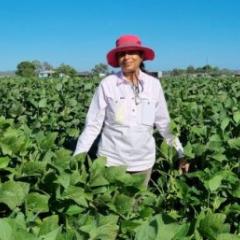To kick off National Biosecurity Week, The University of Queensland’s Dr Kayvan Etebari has been appointed a Queensland Biosecurity Mates Ambassador.
The three new Biosecurity Mates Ambassadors were inducted by Minister for Agricultural Industry Development and Fisheries and Minister for Rural Communities, The Honourable Mark Furner.
With his new role, Dr Etebari, whose background is in Entomology and Insect Molecular Biology, aims to promote strong collaborations between academia, industry, and government to increase biosecurity efforts across Australia.
“My goal is to increase awareness and understanding of biosecurity issues, promote innovative solutions, and ensure Queensland remains resilient against emerging threats,” he said.
“I also hope to engage communities and empower them with the knowledge and tools needed to protect our environment and agriculture from biosecurity risks.”
Dr Etebari said education and community engagement will be essential in tackling biosecurity issues moving forward.
With biosecurity jobs in high demand, he sees this as an opportunity to train students to meet the criteria for these roles.
“As part of this effort, I will work to integrate more biosecurity-related content into our UQ courses and programs and am currently coordinating the Plant Biosecurity course at UQ’s Gatton campus,” Dr Etebari said.
“This new role allows me to further engage our students with government agencies, providing them with practical experiences and connections.
“Through these initiatives, we will prepare knowledgeable, work-ready students who are well-equipped for careers in biosecurity.”
The importance of biosecurity in Queensland is becoming an ever-important issue as risks from global trade, climate change, and the movement of people and goods grow.
Dr Etebari said each of these factors elevate the potential for invasive species, pests, and diseases to enter and spread within the state.
“Biosecurity is crucial for protecting our agriculture, which is a significant contributor to the economy, as well as safeguarding our unique ecosystems and public health,” he said.
“Effective biosecurity measures ensure that we can maintain food security, preserve biodiversity, and support the livelihoods of Queenslanders.
“And everyone has a role to play – simple actions such as reporting unusual pests or diseases and being mindful of biosecurity regulations when travelling or purchasing plants and animals can make a significant difference.”
National Biosecurity Week emphasises the significance of biosecurity in the protection of our environment, food supply and economy, and is an opportunity to highlight the collaborative efforts of government, industry and the community in raising biosecurity awareness and promoting biosecurity practices.



